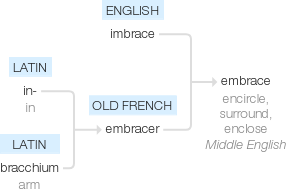Embrace
Middle English (in the sense ‘encircle, surround, enclose’; formerly also as imbrace ): from Old French embracer, based on Latin in- ‘in’ + bracchium ‘arm’.
wiktionary
The verb is derived from Middle English embracen(“to clasp in one's arms, embrace; to reach out eagerly for, welcome; to enfold, entwine; to ensnare, entangle; to twist, wrap around; to gird, put on; to lace; to be in or put into bonds; to put a shield on the arm; to grasp (a shield or spear); to acquire, take hold of; to receive; to undertake; to affect, influence; to incite; to unlawfully influence a jury; to surround; to conceal, cover; to shelter; to protect; to comfort; to comprehend, understand”)[and other forms], [1] from Old French embracer, embracier(“to kiss”) (modern French embrasser(“to kiss; (dated) to embrace, hug”)), from Late Latin *imbracchiāre, from in-(prefix meaning ‘in, inside, within’)) + bracchium(“arm”). The English word is analysable as em- + brace. [2] [3]
The noun is derived from the verb. [4]
etymonline
embrace (v.)
mid-14c., "clasp in the arms," from Old French embracier (12c., Modern French embrasser) "clasp in the arms, enclose; covet, handle, cope with," from assimilated form of en- "in" (see en- (1)) + brace, braz "the arms," from Latin bracchium (neuter plural brachia) "an arm, a forearm," from Greek brakhion "an arm" (see brachio-). Related: Embraced; embracing; embraceable. Replaced Old English clyppan (see clip (v.2)), also fæðm (see fathom (v.)). Sexual sense is from 1590s.
embrace (n.)
"a hug," 1590s, from embrace (v.). Earlier noun was embracing (late 14c.). Middle English embrace (n.) meant "bribery."
